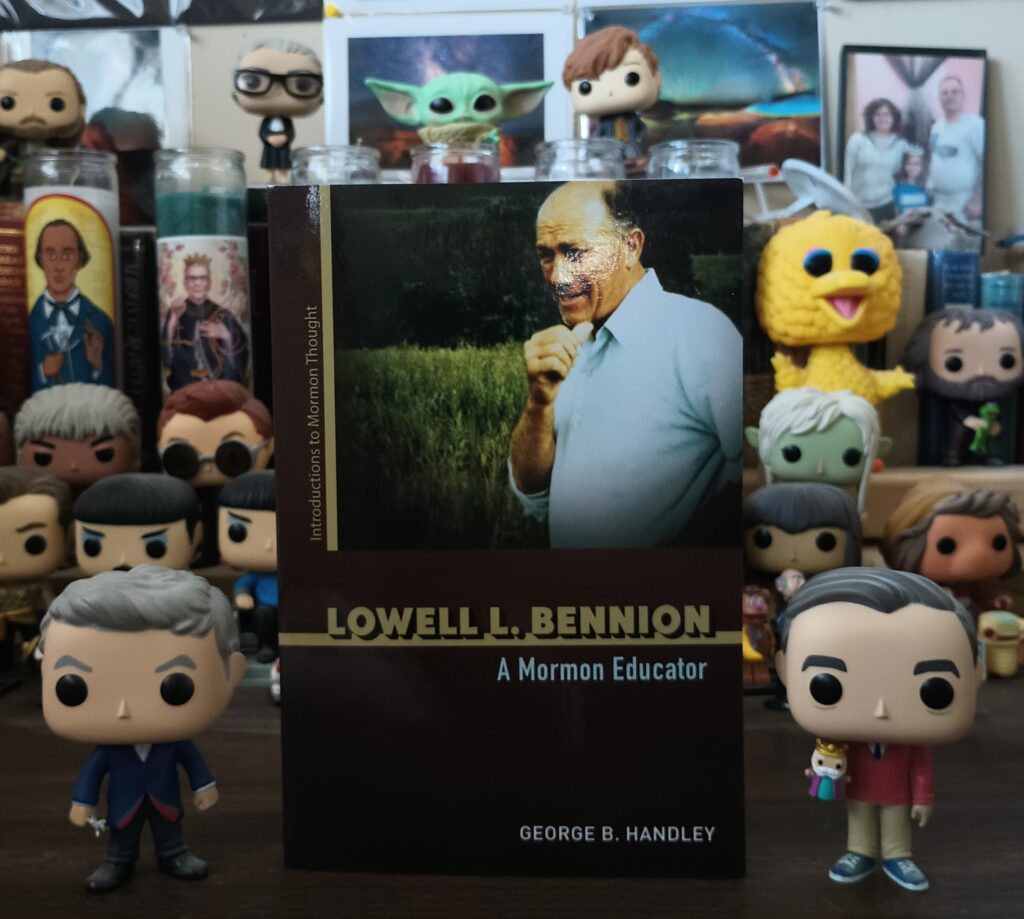
Title: Lowell L. Bennion: A Mormon Educator
Author: George B. Handley
Publisher: University of Illinois Press
Genre: Religious Non Fiction
Year Published: 2023
Number of Pages: 123
Binding: Hardcover, Paperback, and eBook
ISBN-13: Hardcover: 978-0-252-04539-4; Paperback: 978-0-252-08751-6; eBook: 978-0-252-05499-0
Price: $110 (hardcover) /$14.95 (paperback) / $14.95 (ebook)
Reviewed by Richard Ji for the Association for Mormon Letters
Lowell L. Bennion: A Mormon Educator by George B. Handley is part of the Introductions to Mormon Thought Series edited by Matthew Bowman and Joseph Spencer. It is published by the University of Illinois Press. The series is intended “to provide readers with accessible and short introductions to important figures in the intellectual life of the religious movement that traces its origins to the prophetic career of Joseph Smith” (Foreward). The term ‘Mormon’ is intended to be inclusive of all faith traditions falling into this category. Furthermore, the series aims to include thought leaders later than the 19th century and from multiple disciplinary lenses including “philosophy, sociology, literary criticism, and media studies, among others” (Foreward). Lowell L. Bennion (1908-1996) was a Latter-Day Saint educator who served as the director of the LDS Institute at the University of Utah, the Community Service Council in Salt Lake City, and the founder of a boys’ ranch that taught moral values. He was also a great humanitarian.
Brigham Young University Humanities Professor George B. Handley is ideally suited to write this work. Handley is a disciple of Bennion. He attended Bennion’s boys ranch as a young boy and later as a camp counselor. So, Handley has first-hand knowledge of his subject and is well-versed in Bennion’s publications/teachings. In fact, he has also written the book Learning to Like Life: A Tribute to Lowell Bennion. Handley considers Bennion as “Mormonism’s greatest ethicist and its most successful and influential educator of the past century” (p. 32). Although the book is written by a sympathetic devotee, Handley is not a sycophant. His efforts of objectivity are apparent.
The book itself is short in pages, but it is long on meaningful content. It is packed with intelligent analyses of Bennion’s teachings and presents the information in a compelling, thought-provoking fashion. While his subject was known for teaching plainly and without scholarly apparatus, Handley’s work is presented in an academic fashion, consistent with the expectations of a university press as well as the prowess of the author. After the foreword, Introductions into the Mormon Thought Series, and Acknowledgements; there are four chapters.
Chapter One: The Life of a Mormon Educator
Chapter Two: The Abundant Life
Chapter Three: A Rational Faith
Chapter Four: Social Morality
Closing the book is a Bibliographic Essay, Notes, Works Cited, and Index sections. Chapter One includes biographical information and places Bennion in context with his times. The next three chapters seek to outline Bennion’s teachings through different lines of inquiry. Each chapter essay can be read independently of one another. Collectively, the reader comes away with a comprehensive view of Lowell Bennion and of his teachings.
Handley’s book, Lowell L. Bennion: A Mormon Educator, helps one to appreciate the greatness of an otherwise forgotten man. Bennion was a faithful Latter-Day Saint, but his personal theology left ample room for multiple ways to interpret the gospel. Once, Apostle John Widstoe asked the young Bennion if he still believed the gospel to be true. Bennion’s response was, “Elder Widstoe, as far as it’s interpreted correctly” (p.6). Bennion’s core belief was that while many Latter-Day Saints focus on our eternal salvation, we in fact should be placing more emphasis on the present. He felt and lived the idea that we ought to place priority on looking after and addressing the needs of underprivileged individuals and groups around us today. Such belief would supersede any religious, political, organizational, and cultural considerations that would preclude such moral service. In Bennion’s gospel, there is no room for dogma over people. Bennion taught that “we should practice Christianity, not just Churchianity” (p. 90).
I have read a couple of Bennion’s publications previously, including The Things That Matter Most and How Can I Help? Bennion’s simple style of presentation may betray the depth and quality of his thoughts. In fact, the material may seem rather prosaic. However, Handley’s examination of Bennion’s work sagaciously brings to light Bennion’s preeminence. He does so by contextualizing Bennion with his contemporaries including leaders/members of the Church of Jesus Christ of Latter-Day Saints who were either sympathetic or diametrically opposed to Bennion’s philosophies. Such comparisons and contrasts illustrate the preeminence of Bennion’s teachings and example.
In many ways, Bennion was ahead of his time and in other ways, he was consistent with his time. However, his ability to push the status quo while remaining a faithful member of the Church is noteworthy. His example of living his beliefs in action versus merely in thought and word is exemplary. Bennion lived what he taught and was true to his inner compass, even if may have been at odds with the mainstream. He is a model and inspiration to all who may have divergent views but seek to truly build the Lord’s kingdom in constructive ways. Handley excellently helps the reader to understand Lowell B. Bennion as an archetype.
Although I have read George B. Handley’s earlier and self-published tribute to Bennion, Lowell B. Bennion: A Mormon Educator gave me a superordinate appreciation of Bennion’s legacy. I have clarity on the greatness of the man and like Handley, lament his relative obscurity. This is a book worth reading again and again. There is so much fodder for thought which can be readily applied in today’s context and world. I highly recommend this book.
